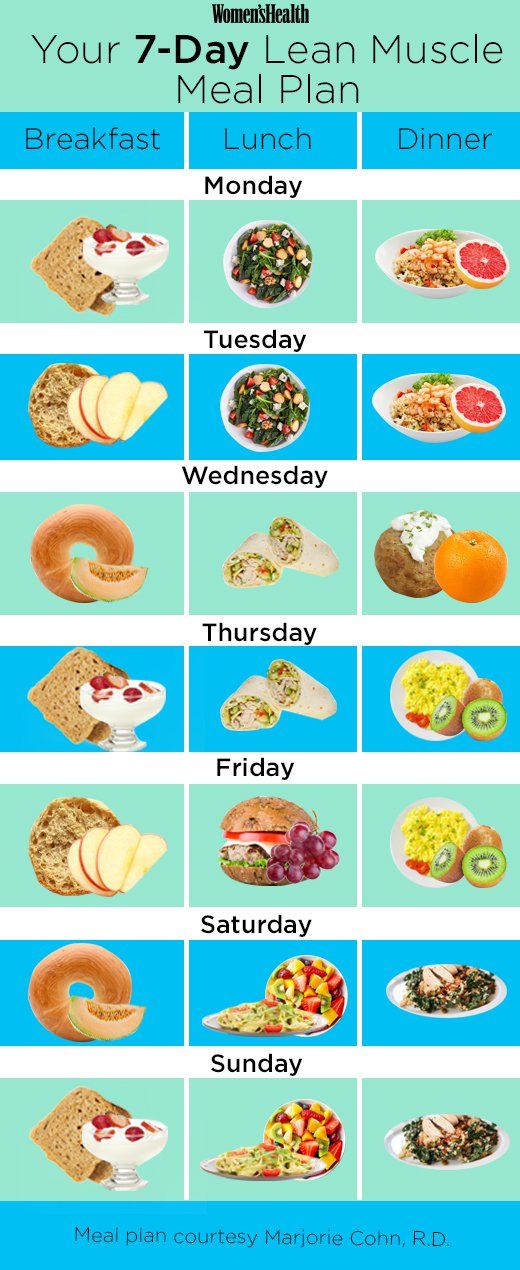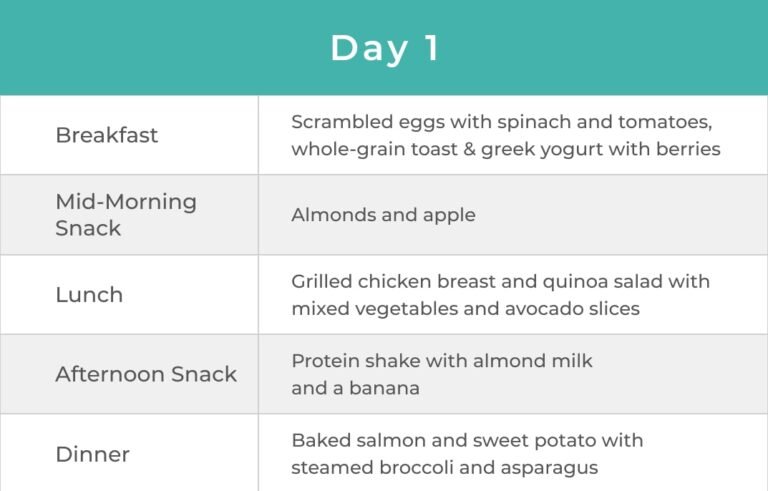Building muscle and losing fat can be challenging. This 7-day meal plan aims to help you achieve both goals.
Many people struggle to find the right balance between gaining muscle and losing fat. It requires a combination of the right nutrition and consistent exercise. A well-structured meal plan can make this process easier and more effective. In this blog post, we will explore a 7-day meal plan designed to support muscle gain and fat loss.
This plan includes nutrient-dense foods that fuel your workouts and aid recovery. By following this meal plan, you can simplify your diet and stay on track with your fitness goals. Get ready to transform your body with these carefully selected meals.
Introduction To The 7 Day Meal Plan
Are you aiming to build muscle and lose fat? Our 7 Day Meal Plan can help you reach your goals. This plan balances nutrition and taste, ensuring you enjoy your meals while seeing results.
Let’s dive into how this plan works and what you can expect.
Why This Plan Works
Our meal plan is based on scientific research and expert advice. It includes the right balance of protein, carbohydrates, and fats. Each meal is designed to fuel your workouts and support muscle recovery.
Here are some key reasons why this plan is effective:
- High Protein Intake: Helps in muscle repair and growth.
- Balanced Carbs: Provides energy for your workouts.
- Healthy Fats: Supports overall health and hormone production.
Goals And Benefits
This meal plan has clear goals and offers many benefits. Here’s what you can achieve:
- Muscle Gain: Increase muscle mass with high-protein meals.
- Fat Loss: Lose fat by following a calorie-controlled diet.
- Improved Energy: Feel more energized throughout the day.
Here is a sample meal plan for one day:
| Meal | Food | Calories |
|---|---|---|
| Breakfast | Oatmeal with Berries and Almonds | 300 |
| Snack | Greek Yogurt with Honey | 150 |
| Lunch | Grilled Chicken Salad | 400 |
| Snack | Apple and Peanut Butter | 200 |
| Dinner | Salmon with Quinoa and Veggies | 500 |
Follow this plan, and see how your body transforms.

Credit: www.womenshealthmag.com
Nutritional Principles
To achieve muscle gain and fat loss, understanding nutritional principles is crucial. A balanced approach ensures your body gets the right nutrients. This section provides key insights into macronutrient breakdown and calorie requirements.
Macronutrient Breakdown
Macronutrients are the essential nutrients your body needs in large amounts. They include proteins, carbohydrates, and fats. Each plays a unique role in muscle gain and fat loss.
| Macronutrient | Role | Recommended Percentage |
|---|---|---|
| Proteins | Builds and repairs muscles | 30-40% |
| Carbohydrates | Provides energy | 40-50% |
| Fats | Supports cell function | 20-30% |
Proteins are crucial for muscle repair and growth. Include lean meats, fish, and plant-based proteins. Carbohydrates fuel your workouts and daily activities. Choose complex carbs like whole grains and vegetables. Fats are necessary for overall health. Opt for healthy fats like avocados, nuts, and olive oil.
Calorie Requirements
Calculating your daily calorie needs is essential for muscle gain and fat loss. You must consume enough calories to fuel your activities and support muscle growth. But not so much that you gain unwanted fat.
Use the Harris-Benedict formula to determine your Basal Metabolic Rate (BMR). This formula calculates the number of calories your body needs at rest.
BMR = 10 weight (kg) + 6.25 height (cm) - 5 age (years) + 5 (for men) or - 161 (for women)
After finding your BMR, multiply it by an activity factor:
- Sedentary (little or no exercise): BMR 1.2
- Lightly active (light exercise/sports 1-3 days/week): BMR 1.375
- Moderately active (moderate exercise/sports 3-5 days/week): BMR 1.55
- Very active (hard exercise/sports 6-7 days a week): BMR 1.725
- Super active (very hard exercise/physical job): BMR 1.9
To gain muscle, increase your calorie intake by 10-20% above your Total Daily Energy Expenditure (TDEE). To lose fat, reduce your calorie intake by 10-20% below your TDEE.
Meal Timing And Frequency
Understanding meal timing and frequency is crucial for muscle gain and fat loss. When you eat can impact how your body uses nutrients. It can also affect your energy levels and workout performance. Let’s dive into the details to help you make the best choices for your goals.
Importance Of Timing
Meal timing can influence your body’s ability to build muscle and burn fat. Eating at the right times ensures your body has the nutrients it needs for muscle growth. It also helps manage hunger and maintain energy levels.
Consistent eating schedules can help regulate metabolism. This helps your body efficiently use the food you consume. Eating at the right times can also help control cravings, making it easier to stick to your diet.
Ideal Meal Schedule
For optimal results, spread your meals throughout the day. This ensures a steady supply of nutrients. Here’s a simple meal schedule:
| Meal | Time |
|---|---|
| Breakfast | 7:00 AM |
| Mid-Morning Snack | 10:00 AM |
| Lunch | 1:00 PM |
| Afternoon Snack | 4:00 PM |
| Dinner | 7:00 PM |
| Evening Snack | 9:00 PM |
Eating every 2-3 hours can keep your metabolism active. It also helps maintain stable blood sugar levels. This schedule supports muscle repair and growth by providing regular nutrient intake.
Consider these tips for meal timing:
- Post-Workout: Eat a meal or snack within 30 minutes after exercising. This helps with muscle recovery.
- Pre-Workout: Have a small meal or snack 1-2 hours before a workout. This fuels your body for better performance.
- Bedtime: A light, protein-rich snack before bed can support muscle repair overnight.
Following this meal schedule can help you achieve your muscle gain and fat loss goals. Consistency is key. Stick to your plan and watch your body transform.

Credit: dr-muscle.com
Grocery Shopping List
Planning your meals for muscle gain and fat loss starts with the right groceries. A well-prepared grocery shopping list saves time and keeps you on track. Let’s break it down into essential ingredients and tips for shopping.
Essential Ingredients
Stock up on lean proteins like chicken breast, turkey, and fish. These are crucial for muscle growth. Don’t forget plant-based proteins like beans and lentils for variety.
Healthy fats are also important. Include avocados, nuts, and olive oil. These fats help with recovery and overall health.
Complex carbs fuel your workouts. Buy whole grains like brown rice, quinoa, and oats. Sweet potatoes and whole-wheat bread are great options too.
Vegetables and fruits provide vitamins and minerals. Add spinach, broccoli, berries, and bananas to your list. They support muscle function and recovery.
Dairy or dairy alternatives are necessary for calcium and protein. Greek yogurt, cottage cheese, and almond milk are good choices.
Tips For Shopping
Create a list before heading to the store. This prevents impulse buying and ensures you get everything you need.
Shop the perimeter of the store first. Fresh produce, meats, and dairy are usually located there. Avoiding the aisles helps you skip processed foods.
Buy in bulk when possible. Items like oats, rice, and nuts are often cheaper in larger quantities. This also ensures you have enough stock for the week.
Check for sales and discounts. Saving money on groceries means you can invest in higher-quality items. Look for deals on fresh produce and lean meats.
Don’t shop when hungry. It’s easier to stick to your list and avoid unhealthy temptations.
Day-by-day Meal Breakdown
This 7-day meal plan will help you gain muscle and lose fat. Each day is designed to focus on different macronutrient ratios. Follow this plan to meet your fitness goals effectively. Here’s a breakdown of what to eat each day.
Day 1: High Protein
Start your week with a high-protein day. Protein is crucial for muscle growth.
- Breakfast: Scrambled eggs with spinach and tomatoes, whole grain toast.
- Mid-Morning Snack: Greek yogurt with berries.
- Lunch: Grilled chicken breast, quinoa, mixed greens with olive oil dressing.
- Afternoon Snack: Protein shake with almond milk.
- Dinner: Baked salmon, steamed broccoli, and sweet potatoes.
Day 2: Balanced Macros
Balance your meals with equal amounts of protein, carbs, and fats.
- Breakfast: Oatmeal with banana slices and chia seeds.
- Mid-Morning Snack: Apple slices with peanut butter.
- Lunch: Turkey wrap with whole grain tortilla, lettuce, and avocado.
- Afternoon Snack: Mixed nuts and an orange.
- Dinner: Beef stir-fry with bell peppers, onions, and brown rice.
Day 3: Low Carb
Reduce your carb intake to help with fat loss.
- Breakfast: Omelette with mushrooms, bell peppers, and cheese.
- Mid-Morning Snack: Celery sticks with hummus.
- Lunch: Grilled shrimp salad with mixed greens and vinaigrette.
- Afternoon Snack: Hard-boiled eggs.
- Dinner: Pork chops with cauliflower mash and asparagus.
Day 4: High Protein
Another high-protein day to continue building muscle.
- Breakfast: Cottage cheese with pineapple chunks.
- Mid-Morning Snack: Protein bar.
- Lunch: Tuna salad with mixed greens and avocado.
- Afternoon Snack: Edamame.
- Dinner: Grilled steak, green beans, and quinoa.
Day 5: Balanced Macros
Maintain balanced nutrition to keep your energy levels stable.
- Breakfast: Whole grain pancakes with blueberries and a touch of honey.
- Mid-Morning Snack: Cottage cheese with sliced peaches.
- Lunch: Chicken Caesar salad with whole grain croutons.
- Afternoon Snack: Smoothie with spinach, banana, and protein powder.
- Dinner: Baked cod, roasted Brussels sprouts, and brown rice.
Day 6: High Carb
Increase your carb intake to fuel your workouts.
- Breakfast: Bagel with cream cheese and smoked salmon.
- Mid-Morning Snack: Granola bar.
- Lunch: Pasta with marinara sauce and grilled chicken.
- Afternoon Snack: Fruit smoothie with mixed berries.
- Dinner: Rice bowl with black beans, corn, and grilled veggies.
Day 7: Cheat Meal
Enjoy a cheat meal to reward yourself. This helps you stay motivated.
- Breakfast: French toast with syrup and berries.
- Mid-Morning Snack: Chocolate protein shake.
- Lunch: Cheeseburger with a whole grain bun and sweet potato fries.
- Afternoon Snack: Ice cream or your favorite treat.
- Dinner: Pizza with your choice of toppings.
Sample Recipes
Finding the right meals for muscle gain and fat loss can be a challenge. This 7-day meal plan includes delicious sample recipes to meet your fitness goals. From hearty breakfasts to satisfying dinners, these meals provide the right balance of nutrients.
Breakfast Ideas
Start your day with these high-protein and nutrient-dense breakfast recipes.
- Oatmeal with Berries and Protein Powder: Mix 1/2 cup oats, 1 scoop protein powder, and a handful of berries.
- Greek Yogurt Parfait: Layer 1 cup Greek yogurt, 1/2 cup granola, and fresh fruit.
- Scrambled Eggs with Spinach: Cook 3 eggs with a handful of spinach in olive oil.
Lunch Options
These lunch recipes are perfect for muscle gain and fat loss.
- Grilled Chicken Salad: Combine 1 grilled chicken breast, mixed greens, cherry tomatoes, and a light vinaigrette.
- Quinoa Bowl: Mix 1 cup cooked quinoa, black beans, corn, avocado, and salsa.
- Tuna Wrap: Fill a whole wheat wrap with 1 can of tuna, lettuce, and cucumber slices.
Dinner Recipes
End your day with these hearty and healthy dinners.
- Baked Salmon with Veggies: Season a salmon fillet, bake with a side of broccoli and carrots.
- Turkey Meatballs with Zoodles: Prepare turkey meatballs, serve with zucchini noodles and marinara sauce.
- Stir-fry with Beef and Veggies: Cook beef strips with bell peppers, onions, and soy sauce.
Snacks And Smoothies
Keep your energy up with these protein-packed snacks and smoothies.
- Almonds and Greek Yogurt: Enjoy a handful of almonds with a cup of Greek yogurt.
- Protein Smoothie: Blend 1 scoop protein powder, 1 banana, and a cup of almond milk.
- Apple Slices with Peanut Butter: Dip apple slices in natural peanut butter.
Workout Integration
Integrating workouts with a 7-day meal plan for muscle gain and fat loss maximizes your results. The right nutrition fuels your workouts and aids recovery. This plan balances pre- and post-workout nutrition to optimize muscle growth and fat loss.
Pre-workout Nutrition
Pre-workout meals are vital for energy and performance. Consume your meal 60-90 minutes before exercising. Focus on a balance of proteins and carbohydrates.
Examples of pre-workout meals:
- Oatmeal with a scoop of protein powder
- Greek yogurt with berries and honey
- Chicken breast with brown rice
Hydration is key. Drink 16-20 ounces of water before your workout. Avoid high-fat foods which slow digestion.
Post-workout Meals
Post-workout nutrition is crucial for muscle recovery and growth. Eat within 30-60 minutes after exercising. Focus on protein and simple carbohydrates.
Examples of post-workout meals:
- Grilled chicken with sweet potato
- Protein shake with a banana
- Eggs with whole-grain toast
Hydrate well. Drink 16-24 ounces of water post-workout. This helps replenish fluids lost through sweat.
Adjust portion sizes based on your body weight and goals. Consistency is key for the best results.
Tips For Success
Embarking on a 7-day meal plan for muscle gain and fat loss requires dedication and strategy. Success is not just about the meals you eat but also the habits you maintain. Here are some essential tips to help you achieve your goals.
Staying Consistent
Consistency is key to success. Stick to your meal plan daily. Make sure you prepare your meals in advance. This will help you avoid last-minute unhealthy choices. Consider using a meal prep schedule. Here is an example:
| Day | Meal Prep Tasks |
|---|---|
| Sunday | Cook proteins, chop vegetables, portion out snacks |
| Wednesday | Replenish fresh produce, prepare mid-week meals |
Stick to a consistent eating schedule. Eat every 3-4 hours. This keeps your metabolism active.
Tracking Progress
Monitor your progress to stay on track. Use a food diary or app to log meals. Track your weight and body measurements weekly. This helps you see changes over time. Consider tracking the following metrics:
- Weight
- Body Fat Percentage
- Muscle Mass
- Energy Levels
Review your progress regularly. Adjust your plan as needed.
Adjustments And Tweaks
Your body will adapt over time. It’s important to make adjustments. If you’re not seeing results, tweak your meal plan. Here are some adjustments you can make:
- Increase protein intake if muscle gain is slow.
- Reduce carb intake if fat loss stalls.
- Incorporate more healthy fats for better satiety.
- Adjust portion sizes based on hunger and energy levels.
Listen to your body. Make small changes and observe the effects.
Faqs
Planning meals for muscle gain and fat loss can be challenging. Many people have questions about the best way to approach this. Here are some frequently asked questions (FAQs) to help you navigate your 7-day meal plan.
Common Questions
What should I eat for breakfast? A good breakfast includes protein and healthy fats. Eggs, avocado, and spinach are a great start. You can add whole-grain toast for more energy.
How much protein do I need? Aim for 1.2 to 2 grams of protein per kilogram of body weight. This helps muscle repair and growth.
Can I have snacks? Yes, snacks are important. Choose protein-rich snacks like Greek yogurt or a handful of nuts. They keep you full and support muscle gain.
Troubleshooting Issues
What if I feel hungry all the time? Check your meal sizes and snack choices. You might need more protein or fiber. Drink plenty of water to stay full.
Why am I not losing fat? Look at your calorie intake. You might be eating too much. Ensure you are also doing regular exercise. Muscle gain takes time, so be patient.
Can I have cheat meals? Yes, but keep them in moderation. One cheat meal a week is okay. It helps you stay motivated without ruining your progress.
:max_bytes(150000):strip_icc()/Muscle-Gain-Meal-PlanV2-2cb5a2b27d55421ab2c0e82c4bab3804.png)
Credit: www.verywellfit.com
Frequently Asked Questions
What Foods Help With Muscle Gain?
Foods rich in protein like chicken, eggs, and beans help with muscle gain. Include healthy fats and complex carbs. This combination supports muscle repair and growth.
Can You Lose Fat While Gaining Muscle?
Yes, it’s possible to lose fat and gain muscle simultaneously. Focus on high-protein meals, strength training, and maintaining a calorie deficit. Consistency is key.
How Many Meals Per Day For Muscle Gain?
Eating 5-6 small, balanced meals per day is effective. This ensures continuous nutrient supply and supports muscle growth. Include protein in each meal.
Is Cardio Necessary For Fat Loss?
Yes, cardio helps in fat loss but should be combined with strength training. This combination preserves muscle while burning fat. Include moderate-intensity cardio sessions.
Conclusion
Achieving muscle gain and fat loss requires a solid meal plan. Stick to balanced meals. Include protein, healthy fats, and complex carbs. Stay consistent for best results. Drink plenty of water. Avoid processed foods and sugary drinks. Track your progress.
Adjust as needed. Remember, patience is key. Rome wasn’t built in a day. Trust the process. Your body will thank you. Happy meal planning!


